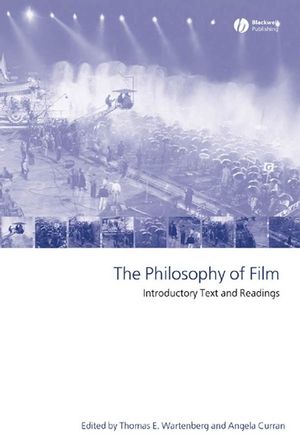|
Textbook
The Philosophy of Film: Introductory Text and ReadingsISBN: 978-1-4051-1442-4
Paperback
322 pages
February 2005, ©2005, Wiley-Blackwell
 This is a Print-on-Demand title. It will be printed specifically to fill your order. Please allow an additional 10-15 days delivery time. The book is not returnable.
Other Available Formats: Hardcover
|
||||||
General Introduction..
Part I: Do We Need Film Theory?.
Introduction.
Study Questions.
1. Prospects for Film Theory (Noël Carroll).
2. Can Scientific Models of Theorizing Help Film Theory (Malcolm Turvey).
3. Philosophy of Film as the Creation of Concepts (Gilles Deleuze).
Part II: What Is the Nature of Film?.
Introduction.
Study Questions.
4. Defining the Photoplay (Hugo Munsterberg).
5. The Artistry of Silent Film (Rudolph Arnheim).
6. Cinematic Realism (Andre Bazin).
7. Film, Photography, and Transparency (Kendall L. Walton).
8. Non-fictional Cinematic Artworks and Knowledge (Trevor Ponech).
Part III: Do Films Have Authors?.
Introduction.
Study Questions.
9. La Politique des Auteurs (François Truffaut).
10. Auteur Theory and Film Evaluation (Andrew Sarris).
11. The Idea of Film Criticism (Pauline Kael).
12. Against Authorship (Stephen Heath).
13. DVD’s and the Director’s Intentions (Deborah Parker and Mark Parker).
Part IV: How Do Films Engage Our Emotions?.
Introduction.
Study Questions.
14. Narrative Desire (Gregory Currie).
15. Spectator Emotion and Ideological Film Criticismm (Carl Plantinga).
16. Engaging Characters (Murray Smith).
17. The Paradox of Horror (Noël Carroll).
Part V: Must Films Have Narrators?.
Introduction.
Study Questions.
18. Principles of Film Narration (David Bordwell).
19. The Cinematic Narrator (Seymour Chatman).
20. Narration as Showing (George M. Wilson).
Part VI: Can Films Be Socially Critical?.
Introduction.
Study Questions.
21. The Politics of Representation (Michael Ryan and Douglas Kellner).
22. But Would You Want Your Daughter To Marry One? Politics and Race in Guess Who’s Coming To Dinner (Thomas E. Wartenberg).
23. Stella at the Movies: Critical Spectatorship and Melodrama in Stella Dallas (Angela Curren).
Part VII: What Can We Learn From Films?.
Introduction.
Study Questions.
24. Knowledge as Transgression: It Happened One Night (Stanley Cavell).
25. Realist Horror (Cynthia A. Freeland).
26. Philosophy Screened: Viewing The Matrix (Thomas E. Wartenberg).
27. Virtue and Happiness in Groundhog Day (Joseph Kupfer).
Suggestions for Further Reading.
Index.



